The beauty of the Mediterranean diet is that it is not a diet, but the principle of a balanced diet.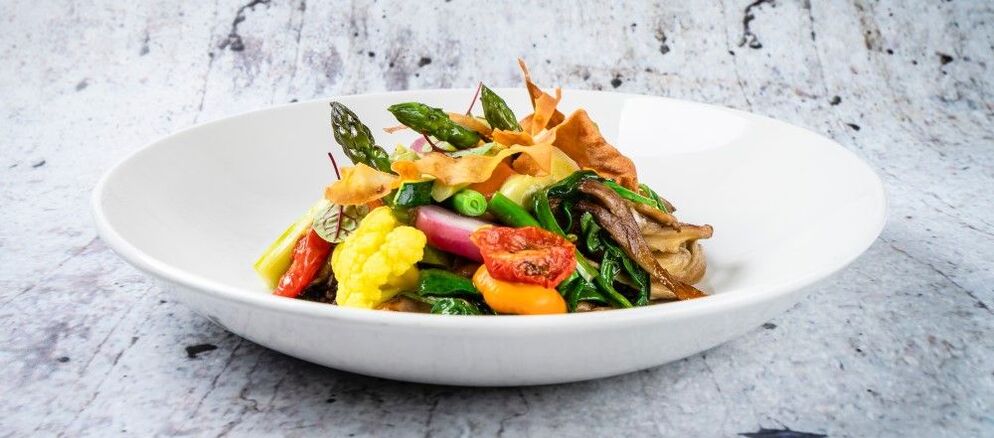 In general, almost any diet implies strict restrictions, preferably under the supervision of a doctor, and there are contraindications. The Mediterranean diet is suitable for everyone, including children, pregnant women and the elderly. Even if you are allergic or intolerant to certain foods, they can easily be replaced by other foods. You will not feel hungry and stressed. On the contrary, you will enjoy your food very much. The residents of these areas are healthy and cheerful. This is not unreasonable.
In general, almost any diet implies strict restrictions, preferably under the supervision of a doctor, and there are contraindications. The Mediterranean diet is suitable for everyone, including children, pregnant women and the elderly. Even if you are allergic or intolerant to certain foods, they can easily be replaced by other foods. You will not feel hungry and stressed. On the contrary, you will enjoy your food very much. The residents of these areas are healthy and cheerful. This is not unreasonable.
The Mediterranean diet is a way of life that allows you to stay in shape, rarely get sick and prolong your youth. Consider adjusting your diet to proper nutrition and study the principles of the Mediterranean diet.
In 2010, the Mediterranean diet was listed by UNESCO as the intangible heritage of the Mediterranean countries: Greece, France, Italy, Morocco, Spain, Croatia, Cyprus, Portugal.
If we look back at history, we can see that in the food culture of ancient Greece and Rome, there are already all the main ingredients of this diet. A lot of vegetables and fruits, seafood, olive oil, beans, a small amount of meat and candy. In other words, plant foods rich in vitamins, minerals and fiber, high-quality protein, healthy fats and slow carbohydrates. They activate metabolism, improve digestion, and strengthen all functional systems of the body. Thanks to antioxidants, they slow down the aging process, increase the production of happy hormones, and promote beauty and harmony. But the most important thing is that they always make themselves feel good. But vegetarian food is not common in Mediterranean countries, and there are almost no dishes made of red meat and heavy dishes.
Scientists from the Harvard School of Public Health have studied the health effects of the Mediterranean diet and concluded: "Mediterranean diet traditions, regular exercise and smoking cessation can prevent more than 80% of coronary heart disease, 70% of strokes and 90% of diabetes 2 types".
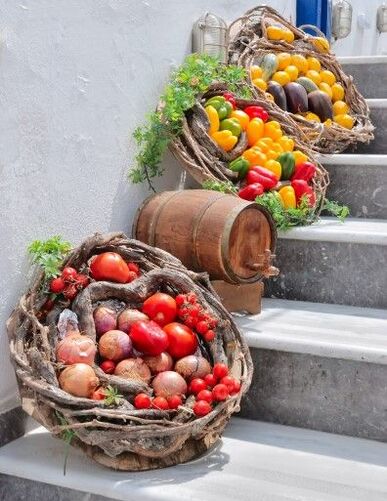
The term itself appeared in the 1950s, and it was introduced by a doctor from the University of Minnesota Professor Ansel Keys. In 1945, he landed in Italy with a group of American soldiers. Observing the locals, Case found that they are less likely to suffer from cardiovascular problems, and their life expectancy is longer than in his hometown. He suggested and confirmed that this is the result of lifestyle and nutritional system. A little earlier, in the late 1930s, Italian nutritionist Lorenzo Piroddi first linked nutrition with susceptibility to diseases such as diabetes, obesity, and bulimia. This is why he is called the "father" of the Mediterranean diet. Ansel Keys stayed on the coast of Italy and lived to be 100 years old.
Let us list the advantages of the Mediterranean diet.
Strengthen the cardiovascular system. Omega fatty acids from olive oil, nuts, seeds, certain types of vegetables and fruits can keep blood vessels clean and elastic.
Prevent or treat diabetes, because the diet is based on low glycemic index foods and almost no sugar is used, which means fast carbohydrates.
Every meal contains fiber-rich foods, which ensure a good metabolism, help to lose weight smoothly and maintain positive motivation over time, improve the state of the nervous system, improve mood, and stimulate brain activity.
Many foods in the Mediterranean diet promote the synthesis of endorphins, dopamine, serotonin and tryptophan, the so-called happiness hormones. This reduces the risk of Parkinson's disease, Alzheimer's disease and dementia in the elderly.
Chatting with friends, spending a long Sunday dinner with family, picnicking in nature, and cooking together are all part of the culture of Mediterranean countries. It is very useful to introduce them into daily life to reduce stress and anxiety levels and increase motivation.
Thanks to flavonoids and antioxidants, youth and beauty can be prolonged. They reduce the damage caused by the oxidation process, which can worsen internal and external conditions. Selenium, manganese, zinc, vitamins A and E make skin firm, and hair shiny and thick.
The Mediterranean diet has hardly any disadvantages.
It can help you switch to proper nutrition and improve your health. It is not seasonal, not time-limited, and means that the menu is varied. Her only drawback is that she can't lose weight quickly.
However, in fact, it became a plus sign. Severe weight loss usually brings trauma to the body: due to the drastic changes in the regime and the marked reduction in daily calorie intake, we feel stressed. The body's response is poor health, decreased strength, immunity and mood. If the diet is not controlled, chronic diseases will aggravate or new diseases will appear.
Yes, there will be a period of time that the weight will quickly disappear, but the brain will turn on a protective mode to prevent hunger, even if it is low-calorie food, the body will try to store fat. Therefore, in most cases, after the end of the diet, the weight will recover, and sometimes even increase.
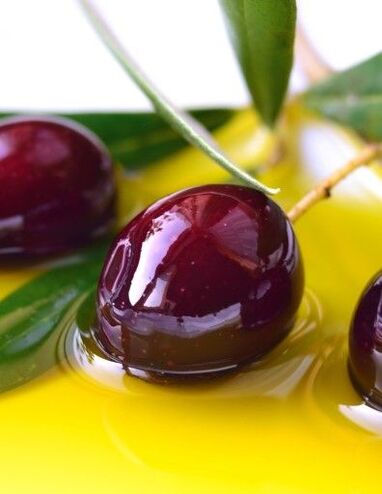
This does not happen with the Mediterranean diet. You will not see rapid changes, but be patient. You will notice the first result within a few months. You should eat small portions five times a day-so that you will not feel hungry and your body will get all the necessary nutrients. Gradually, a reasonable diet will restart the body's functional system, metabolism will improve, and weight will return to normal. Increase physical activity, at least long distance walks, the effect will be obvious.
The list of approved products is extensive. Nutritionists have identified complex carbohydrates, high-quality fats and vegetable sources (60%) in the pyramid. The former include whole grains, durum wheat pasta, whole wheat bread, nuts and seeds, and legumes. The products of this group should be included in the menu every day.
There are many kinds of vegetables. In particular, look for leafy vegetables such as spinach and kale, and vegetables with the lowest starch content such as eggplant and zucchini, cauliflower and broccoli, tomatoes, peppers, and fennel. The daily vegetable intake recommended by the World Health Organization-6 servings per day-is based on the number of vegetables in the Mediterranean diet.
Previously, when there was no modern technology to preserve vegetables, cooking was based on seasonal principles. Alas, under our conditions, seasonal vegetables are a short-lived pleasure. There is a solution: use frozen vegetables. Unlike imported products, quick-freezing is carried out within a few hours after harvest at the peak of maturity, and almost all the vitamins in it are retained. In winter and spring, the freshness of vegetables is a more casual concept. Manufacturers consider long-distance transportation and storage, so they treat it with chemicals.
Chickpeas, lentils and beans contain complete plant protein, rich nutritional complexes and fiber. They are well saturated and produce a feeling of fullness for a long time. Combining legumes and vegetables, you can prepare a variety of balanced meals. In cold weather, thick soup will keep you warm, and salad is a great choice for dinner. Try to eat vegetables and beans for dinner 2 to 3 times a week.
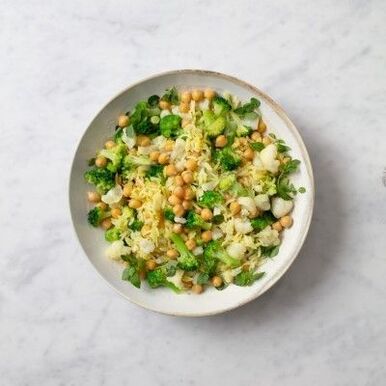
Jasmine rice with chickpeas, mini broccoli, mini cauliflower and truffle oil
raw material:
- Chickpeas (garbanzo beans) Bonduelle 1 can (310 g).
- Mini Broccoli Bonduelle 1 pack (300 g).
- 1 pack of Cauliflower Mini Bonduelle (300 g).
- Jasmine rice 200 grams.
- Basil 40 grams.
- 1 teaspoon of curry
- 20 ml of olive oil.
- Salt to taste.
recipe:
- Follow the instructions to cook the rice. Add curry and stir.
- Heat olive oil in a pan, and saute cabbage and broccoli gently.
- Mix the cabbage, chickpeas, and rice and stir. Add salt if necessary. Garnish with basil leaves before serving.
Pasta made with durum flour is also good: it is low in calories, rich in vitamins and minerals, and easy to digest. In addition, pasta, like cereals, is one of the main sources of B vitamins. Pasta made from unrefined flour gives the body energy. For example, it is recommended to eat before exercise.
Of course, if you pair this dish with a fat sauce or as a side dish of meat, all the benefits can be cancelled-such a service has nothing to do with Mediterranean traditions. A light sauce based on olive oil, vegetables, fish and seafood will be the right choice for pasta.
Spaghetti with mini broccoli and pine nuts
raw material:
- Broccoli packaging (300 grams).
- 250 grams of spaghetti.
- 40 grams of pine nuts.
- 20 ml of olive oil.
- 100 grams of ricotta cheese.
- Salt to taste.
recipe:
- Cook the pasta until it is chewy.
- Follow the instructions to cook the broccoli.
- Break up 100 grams of broccoli with a blender. Mix with ricotta cheese and olive oil.
- Stir the pasta sauce and remaining broccoli, season with salt, and heat in a saucepan over low heat for 2 minutes.
- Fry the pine nuts in a dry pan and sprinkle them on the pasta before serving.
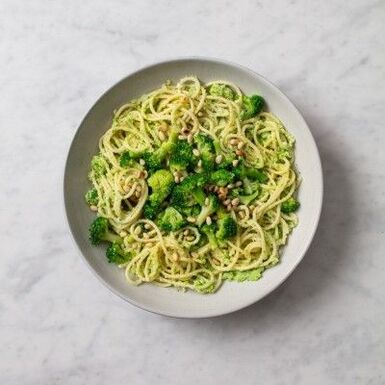
Olive oil is the alpha and omega of the Mediterranean diet and the symbol of the cuisine of the region. Thousands of years ago, olives were eaten here. Untreated, they taste very bitter, so they are salted or squeezed out of oil.
The reason is that oleuropein, a phenolic compound, together with omega fatty acids and vitamin E, determines the benefits of olives. Phenols are powerful antioxidants, have antibacterial and anti-inflammatory properties, and can fight free radicals. Scientists have found that consuming 2-4 tablespoons of olive oil a day can significantly reduce the risk of coronary heart disease.
When it comes to vitamin F, don't be surprised. Many people do not know that essential fatty acids have a common name-vitamin F. They are Archidonic, Linoleic Acid and Linolenic Acid. The human body does not produce them, and can only receive them through food.
But remember, not all olive oils are created equal. The best is extra virgin oil, a cold-pressed oil produced by mechanical means. The acidity, that is, the content of organic acids, does not exceed 0. 8%. The oil fully retains vitamins and antioxidants during the production process and should be stored in dark glass bottles at room temperature. It must not be heat treated.
Add olives anywhere: in salads, soups, main dishes, pies, toast or omelets. Olives have a salty taste; with them, dishes do not require additional salt, which will reduce salt consumption. Find inspiration in our selection of olive recipes.
The second step of the pyramid is the correct source of protein, which accounts for 30% of the Mediterranean diet. Part of the body is from plant foods, most fish and seafood, natural yogurt, white cheese, low-fat cheese (cheese made from goat and sheep milk is particularly popular), white meat (chicken, turkey, rabbit) and eggsGet protein in this group of foods should be eaten three to four times a week.
Not only should fish be eaten on Thursdays because the book of delicious and healthy food is abandoned, but it should be eaten several times a week. If you choose between the river and the ocean, choose the second, fat variety. With it, you can not only get protein, but also Omega 3 acid and iodine, which are rare in food, and an excellent vitamin complex: A, E, D, C, B vitamins, and dense muscle fibersstructure. Therefore, they immediately begin to be digested, which makes fish an ideal dietary product.
Talking about fish usually leads to complaints that it is expensive and it is almost impossible to buy good fish. Let us figure out these exciting questions.
In fact, few people can buy freshly caught fish. In this case, as with vegetables, don't be afraid of deep freezing. Follow the thawing rules: Put it on the bottom of the refrigerator, it takes 10-12 hours to retain all the nutrients. Again, as with vegetables, pay attention to the absence of ice crystals in the package when buying. They are evidence of incorrect storage of fish: no temperature conditions have been observed. Do not freeze the fish yourself.
Fish is an expensive product in all countries, but there is also a way out here. You can't afford salmon or tuna fillets. Buy more affordable varieties: cod, mackerel, pink salmon, herring, halibut, flounder, saury, sardines. In principle, in Mediterranean countries, most families use these fish for cooking, and the dishes made with them are very delicious and varied. Many people ignore canned tuna, but this is in vain: it is much cheaper than fresh, and it is equally healthy if it is made not with oil but with its own juice. Making salads with him is a treat: no need to bother to chop vegetables.
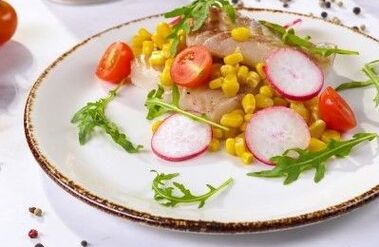
Cod fillet with corn
raw material:
- Young corn Bonduelle 1/3 can (140 g).
- 200 grams of cod fillet.
- 2 radishes.
- 5 cherry tomatoes.
- 2 pinches of lemon zest.
- 1 teaspoon of lemon juice
- The taste of any vegetable.
- Arugula served on the table.
- Season with salt and pepper.
recipe:
- Dry the cod fillets, remove the bones with tweezers, and put the fish in the baking dish. Then lightly sprinkle with lemon juice, knead with a mixture of salt and pepper spice and lemon zest, and bake at 180 degrees in the oven for 15-25 minutes, depending on the size of the fish fillet.
- Cut the cherries in half and the radishes into slices. Chop the herbs.
- Place the finished cod fillet on a plate. Place decorations of corn, tomatoes, radishes and herbs nearby. Garnish with arugula.
The same applies to seafood: we will not target lobsters, oysters and lobsters, but let us take a closer look at mussels and shrimps. Iodine, selenium, zinc, iron, copper, magnesium-this is not a complete list of the minerals they contain, and they are very low in calories. Shrimp is rich in vitamin B12-it is involved in the production of hemoglobin, and in mussels-vitamin E, which protects cell membranes from damage.
The last 10% includes red meat (not more than once a week is recommended), animal fat and simple carbohydrates. Try cooking the meat in a gentle way-stewed or grilled, and then fried on the grill without frying. Without desserts, life will lose its sweet happiness, but you still have to choose healthy desserts. With the least amount of sugar, the natural sweetness of fruits, honey and even vegetables is sufficient. For example, baby corn is sweet, and the desserts are delicious and original. You can also open the can and eat it directly.

Fresh Corn Fruit Salad
raw material:
- 1 can of Bonduelle, young corn (340 g).
- 70 grams of blueberries.
- 70 grams of strawberries.
- 70 grams of raspberries.
- 1 orange.
- 80 grams of walnuts.
- 400 ml of natural yogurt.
recipe:
- Peel the oranges. Cut the oranges into thin slices.
- Drain the canned corn. Mix corn and berries.
- Chop the walnuts, add to the yogurt, and mix.
- Put the fresh corn fruit salad in a small bowl and add walnut yogurt. Serve with a slice of orange.
Finally, a few words about spices.
Rosemary, sage, thyme, and marjoram contain sunny and Mediterranean garden aromas. For centuries, parsley and garlic have been the simplest and most affordable spices used by chefs in the region. The mixture of allspice, Provence or Italian vanilla will make the dishes full of meaning and interesting nuances. In addition, they allow you to use less salt-the spice is bright enough to get a mature taste.

There are almost no prohibited foods in the Mediterranean diet, and their list is consistent with the list given by all nutritionists. This is fast food and any "junk" food, industrial semi-finished products, sauces, candies containing preservatives and flavor enhancers.
Drink plenty of water, don't neglect a glass of dry red wine (but don't drink it anymore! ) and stay healthy!














































































